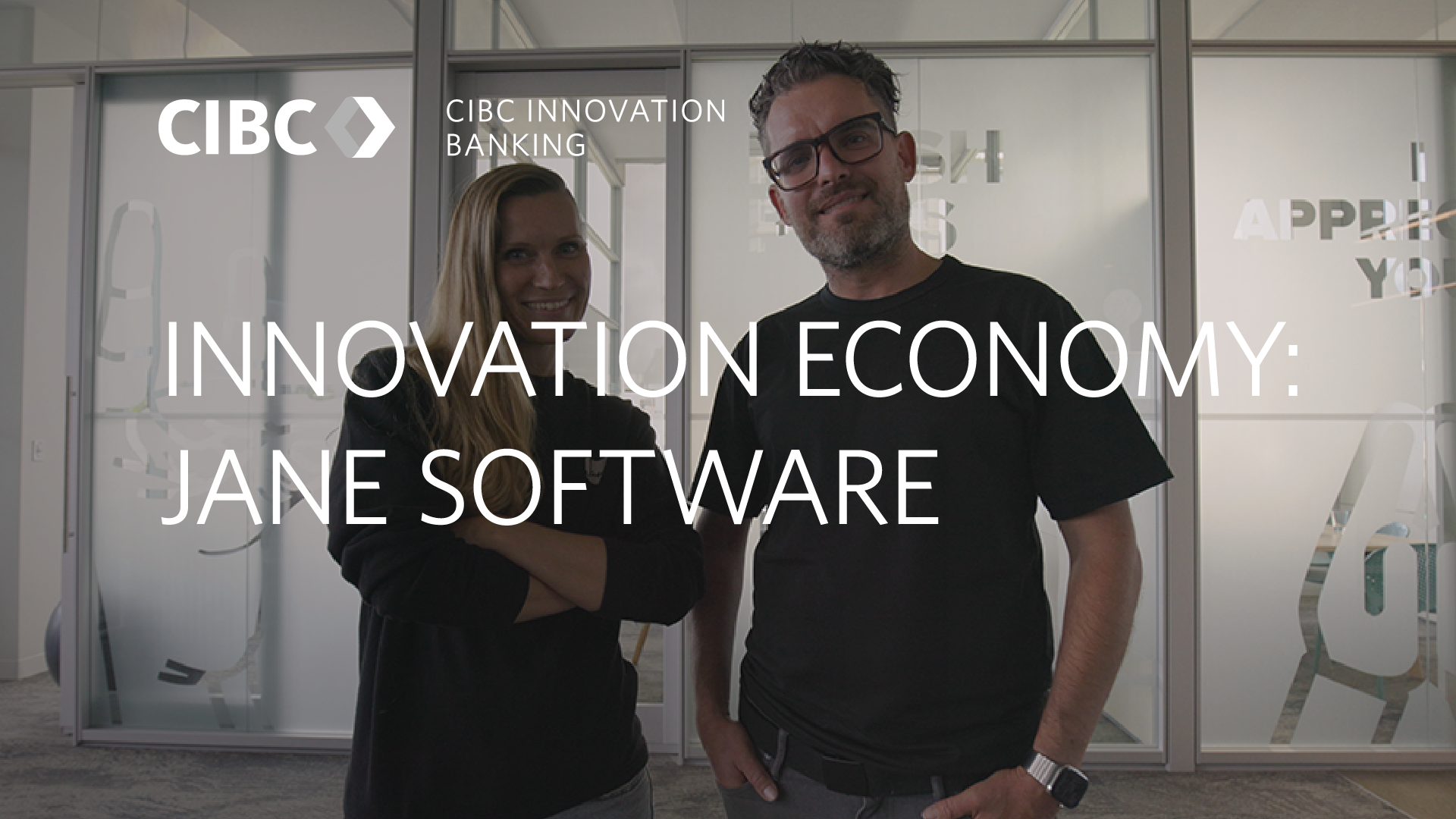VO: Jane Software is a clinic management software company in Vancouver, B.C. Co-founders Allie Taylor and Trevor Johnston built the global success story from the ground up. But when it comes to work-life balance, the pair say there’s no such thing for a start-up entrepreneur.
So how do they juggle the demands of building a successful business while raising families?
I’m Michael Hainsworth, and this is the Innovation Economy series presented by CIBC Innovation Banking.
Speaker 1: Hi, I’m Allie Taylor. I’m co-founder and co-CEO of Jane.
Speaker 2: And I’m Trevor Johnston, co-CEO, and co-founder at Jane.
VO: They started Jane Software in 2017, and they have been working closely ever since. The start-up is now in its growth stage.
Speaker 2: I would say your greatest contribution to this company is that you are the customer.
Speaker 1: I feel like we’re in counselling. I opened a healthcare clinic and in the process of opening the clinic, realized there was a problem I needed to solve. And that there was no software for multi-disciplinary practice. But building that clinic gave me so much information about what it’s like to run a business. We’ve grown Jane by being a product-customer hearted company. And that’s what we really dug in to. It’s been part of our scaling success.
VO: Today, Jane is a world leader in clinic management.
Speaker 1: I think it took us over two years to get our first 200 customers. And now we’re signing up that many customers in four days.
Speaker 2: I remember discovering that 90% of massage therapists in BC are using Jane. That’s incredible. That’s the entire market. And they’re loving Jane, like the feedback, from that group of users is just so enthusiastic.
VO: As a start-up founder, we’re often told it’s important to find a balance between work life and home life. Both Alison and Trevor are parents with families who lead busy lives. So, what’s the secret to work-life balance as a start-up entrepreneur?
Speaker 1: I don’t think work-life balance exists. It creates a lot of guilt in people, I think, because it’s kind of impossible.
Speaker 2: There’s a lot of ordering Americanos at 9pm which I think says somethings about your plan is that day.
Speaker 1: It’s more work-life harmony and that means there is times where some parts of your life song is going to be louder and some parts are going to be quieter.
Speaker 2: Jane was growing quickly and we were scrambling to keep up with the growth. And we would work a full day, we would take a break, you know feed the kids, and then go back to work and work a late shift. We felt that it was important to never ask our team to do the same. We’ve always had a work hard but not long value that we’ve instilled in our staff because we want people to enjoy their lives and they’ve got other things they want to be doing. The team has been so productive. It is amazing to see like 15 different teams starting to spin up their productivity and uh, get their stride.
VO: When any start-up moves into the growth stage, it’s important to shift financing strategies, instead of continuing to trade shares in the company built out of work-life harmony for cash infusions. Alison and Trevor turned to CIBC Innovation Banking for debt financing to help fuel their expansion.
Speaker 2: We spoke to a lot of banks that couldn’t wrap their heads around, uh, a company that had revenue but didn’t have retained earnings and it wouldn’t get passed the risk department to talk to us. So, it took a bank that could wrap their heads around how SAAS works.
Speaker 1: CIBC Innovation Banking is the first bank that talked in our language. They understood the terms that we use. They understood our business model. And so, it was refreshing to finally come across a banking group that could talk SAAS.
Speaker 2: Yeah, they’re good with the sass.
Speaker 1: Sassy. They’re sassy.
VO: Be sure to catch every episode of our Innovation Economy series. Visit cibc.com/InnovationBanking and click the insights link.







